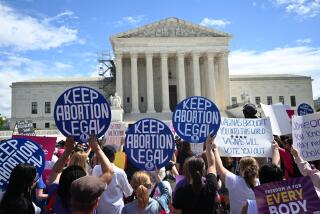Editorial: Supreme Court sides with Muslim inmate -- and helps solidify a key religious right
In what is perhaps their least surprising decision in recent years, the justices of the Supreme Court ruled unanimously Tuesday that an Arkansas prison violated a Muslim prisoner’s rights by forbidding him to grow the half-inch beard he said was required by his religion. When the case was argued last fall, the justices were incredulous at the state’s argument that Gregory Holt’s beard would pose a threat to security. Justice Samuel A. Alito Jr. elicited laughter when he suggested that perhaps a comb could be used to see whether a half-inch beard concealed “a tiny revolver.”
But while Tuesday’s decision was expected, it is still significant. It not only rights a wrong against Holt and put prison officials nationwide on notice that they must make reasonable accommodations to inmates’ sincere religious practices. It also clarifies the importance — and limits — of federal laws providing a measure of protection for religious practice over and above what the 1st Amendment requires.
Until recently, there was a bipartisan consensus that, where it didn’t endanger the public good or interfere with the rights of others, believers should be allowed to opt out of complying with laws that limited their exercise of religion. That view was reflected in the overwhelming congressional support for the 1993 Religious Freedom Restoration Act and the 2000 Religious Land Use and Institutionalized Persons Act.
But support for these laws and similar statutes at the state level has fractured in recent years, with many liberals entertaining second thoughts. One reason is the fear that such laws will be used to justify anti-gay discrimination. Such concerns were raised last year about an overly broad “religious freedom” measure in Arizona that critics said would allow businesses to refuse to serve gay and lesbian customers. The bill was vetoed by then-Gov. Jan Brewer. An even bigger blow to public support for religious liberty was struck by the Supreme Court itself last year in its Hobby Lobby ruling. That decision stretched the meaning of the Religious Freedom Restoration Act beyond all reason, holding that religious owners of some for-profit companies could decline to include contraceptive coverage in their employee health insurance plans.
By contrast, Tuesday’s decision returns to the original purpose of both of those laws: to protect the religious rights of individuals (or businesses) when doing so doesn’t harm others.
Tuesday’s decision is welcome for another reason. The prisoner whose religious freedom was affirmed is a Muslim, and his cause was supported by prominent Christian and Jewish organizations. At a time when some Americans believe that Islam is the enemy or “un-American,” this decision is a timely reminder that religious freedom belongs to Americans of all faiths.
Follow the Opinion section on Twitter @latimesopinion
More to Read
A cure for the common opinion
Get thought-provoking perspectives with our weekly newsletter.
You may occasionally receive promotional content from the Los Angeles Times.






